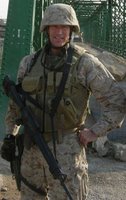
There are very few people who haven't heard of Paul Hackett. He took the national scene by storm last year, when he ran against that woman, Jean Schmidt, in the conservative 2nd Congressional district in Ohio. He lost narrowly, but his campaign reinvigorated Democrats in Ohio and through much of the nation. Here is a tough-talking no-nonsense marine and he is a Democrat. He called Bush a chicken-hawk and repeated it on national TV without blinking an eye. He always speaks his mind and doesn't mince words.
Earlier this year, at the urging of national Democrats, he entered the race to replace that excuse for a senator, Mike DeWine, only to be sabotaged by ... national Democrats.
I met Paul Hackett at his downtown office last week for a chat about Iraq, the elections, and a bunch of other topics. His office overlooks a good portion of downtown Cincinnati and is decorated with pictures of his family, his degrees, plaques and Marine Corps memorabilia. Here's the first part of that interview, dealing mainly with Iraq.
As has now become customary, I began with the standard DL question, "What's your favorite drink?" As it turns out, Paul doesn't drink, having given up alcohol a long time ago. For now, Paul is happy drinking Pellegrino water. If you want to know the story behind his abstinence, buy me a beer at the next DL meeting.
To get things rolling, I asked Paul what he felt about the situation in Iraq: Stay the course or cut and run? We have, after all, turned the corner, right? "We've been turning the corner on a blind alley, getting our national asses handed to us, but not militarily." Any military success that can be achieved in Iraq has been achieved, Paul says. Leaders across the nation are now realizing it's a debacle. In that sense, Paul feels, the national discussion is moving in the right direction. "Less of this nonsense about the insurgency being in its last throes." He is encouraged by the renewed talk about "when are we going to leave, how are we going to leave and what is that part of that world going to look like when we leave."
Paul has no kind words for the Democrats who now insist they were lied to in the lead up to the war. John Kerry and "other alleged Democratic leaders," he says, have access to more classified information and briefings than the average American. Paul charges that, though military leaders like Tony Zinni and Paul Van Riper warned against going to war, and even predicted the emergence of an insurgency, Kerry ignored it. "If he thinks that saying he was lied to somehow or the other exonerates his lack of courage, his lack of insight and his lack of leadership, and therefore make him an electable candidate in 2008, he's gotta get the crack-pipe out of his mouth." Paul was kinder to John Edwards for being "forthright" and apologizing for his support of the war.
Next, I asked Paul about what options the US has now in Iraq. One option, a highly unlikely one, Paul says, is to go from the current troop levels to 500,000 and re-fight the war. This will effectively decimate the infrastructure of the country, generate more hate and discontent in the Middle East, and further destabilize that part of the world. The more likely option is to begin a phased redeployment, and enter into agreements with nations like Kuwait to set up quick reaction forces (QRFs) and bases in "the God-forsaken desert." While violence may go up in the short term, Paul feels things will stabilize in the long term - "five to ten years."
Obviously, Paul has spent a lot of time thinking about and talking about the war in Iraq and the rationale for war. The notion that we're there "spreading democracy" through military force is "utterly preposterous, simplistic and ignorant." The "absolute fucking morons" in the administration don't understand how personal war is, charges Paul. Ultimately, he says, war is about one man killing another man. The administration went into war without the necessary troops, without a clearly defined militarily attainable objective and without an exit strategy. Paul hopes history will place the blame for this war squarely with this administration, even as the administration tries to blame the military for the political failure of the war.
Asked about the military's view of the administration and its policy, Paul pointed to the increasing number of senior military leaders who are coming out against Bush. They understand better than the average soldier the damage inflicted upon the military by Bush and his lackeys and their lack of respect for the military. The proverbial last straw, Paul says, was the way General Shinseki was forced out. Donald Rumsfeld further snubbed Gen. Shinseki by not showing up for his retirement party, a great insult in the military. "Rumsfeld, Cheney and Georgie-porgie don't understand the military. They have a very superficial elitist attitude towards the military, and don't understand military culture."
Paul also charged the administration with mismanaging the post-war reconstruction and alienating allies like Germany and France. Europe has been fighting terrorism much longer and we can learn lessons from them. (Ed note: Someone should tell Rumsfeld. Not that it'll make a difference.) The world has gone from being on our side just after September 11, to being against us and against the Iraq war. Like most people, Paul realizes that the Bush's "popularity" is world-wide: "The world is waiting for this moron to be out of office." He predicts Bush will start pulling troops out just in time for the elections in 2006.
Coming tomorrow: Part II. Get Paul's views on the elections in '06, the Democrats' chances, his political activities and his future plans.






No comments:
Post a Comment